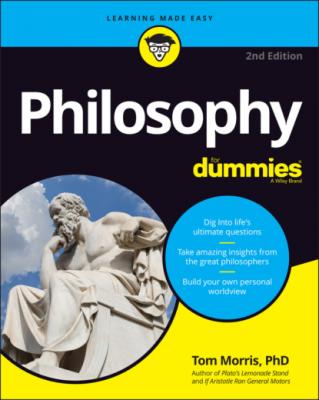Philosophy For Dummies. Tom Morris
Чтение книги онлайн.
Читать онлайн книгу Philosophy For Dummies - Tom Morris страница 20
 sense, the activity; knowing is the intended attainment, or desired result. Nobody just believes stuff for the fun of it. Knowledge is always the intended result.
sense, the activity; knowing is the intended attainment, or desired result. Nobody just believes stuff for the fun of it. Knowledge is always the intended result.
To break down this analysis of knowledge, part by part, and get your head around it, it’s best to start at the end of the definition — “properly justified true belief” – and work forward. That way, you can come to understand it better, and thus come to grasp more deeply what knowledge, as distinct from opinion, or conjecture, or prejudice, really is.
You can’t know something unless you believe it. You can’t know that philosophy is the love of wisdom unless you believe that it is. Belief is necessary for knowledge. It is a part of the package deal. But, again, it’s not the whole package.
Truth is always a part of knowledge. When you discover that what you’ve believed is actually false, even thought you thought you knew it to be true, you thereby discover you never knew it at all. Suppose you have come to believe that all medical vaccines are placebos, nothing but salt water. Imagine that you’ve been in social media echo chambers where this claim is made repeatedly and is backed up with fake claims from alleged scientists who are announcing that vaccines are just a part of government conspiracies to scare people. You may get to the point where you are convinced and so think you now know that all vaccines are bogus. “I don’t just believe it, I know it,” you may say to skeptical friends. But then imagine that you discover it was all a bunch of well-orchestrated political disinformation meant to mislead, and you finally have to admit your belief was false and you didn’t at all know what you thought you knew on that issue.
Confucius once said in the sixth century, BCE that, “When you know a thing, to hold that you know it, and when you do not know a thing, to admit that you do not know it, is knowledge indeed.” Knowledge always tracks truth. And anyone who wants to know what truth itself actually is should be introduced to Aristotle’s famous explanation, that is captured in these inimitable words that begin with defining what’s false and move to what’s true: “To say of what is that it is not, or of what is not that it is, is false; while to say of what is that it is, and of what is not that it is not, is true.” Clear enough? Try to say that real fast ten times in a row. Not even a philosophy graduate student can pull it off. And that’s the truth. It is what it is.
The truth about truth
But is there really any such thing as truth? The viewpoint known roughly as relativism claims that all so-called truth is relative to a perspective, that there really is no absolute objective truth, but that different things may be true for different people, or from diverse perspectives, but nothing is absolutely true apart from a perspective. This is sometimes also known as perspectivalism. Perspectives differ, this viewpoint alleges, and one is as good as another.
But notice a problem with the mere statement of relativism. It says: There really is no such thing as absolute truth. It sounds like relativism is actually suggesting to us that it is revealing the ultimate, absolute truth about truth. But it can’t be that the absolute truth about truth is that there is no absolute truth. Taken literally, relativism ends up actually asserting what it denies, and so it’s self-defeating, or logically incoherent as a philosophical position. If it’s true, then it has to be false, which means it can’t be true.
The question then arises as to why so many people seem to be relativists. Why has relativism in one form or another been so attractive to a number of intellectuals in the 20th century? The answers here may be quite simple. The profound French essayist Montaigne anticipated it all when he once remarked, “The mind is a dangerous weapon, even to the possessor, if he knows not discreetly how to use it.”
But some serious mature adults can fall into relativism, too, and a number of very smart people have found it tempting. So it’s useful to grasp what could possibly attract them to a logically inconsistent position. First, it may be surprising, but it’s true that relativism can serve as a very persuasive intellectual excuse for bad behavior. If there is no absolute truth, there is no absolute moral truth and people can get away with anything they want. Some individuals are relativists because it’s a wonderful form of self-deception, licensing anything they may want to do, despite the disapproval of others. And it’s a view they can use speciously to attempt to convince otherwise good and sensible people to join them in their shenanigans.
There is a second path to adult relativism that is certainly more respectable, however wrong it nonetheless also is. Many sensible people in our time have wanted to promote the virtue of tolerance, and even an intellectual broadmindedness, or cognitive inclusivity in our pluralistic world, and have wrongly thought that relativism is the royal road to cultivating a firm and resilient openness to other people’s beliefs. But the sort of tolerance that is indeed a virtue is best grounded in genuine respect, and it’s not showing respect for any point of view to say that no points of view can possibly capture reality the way that it is.
These